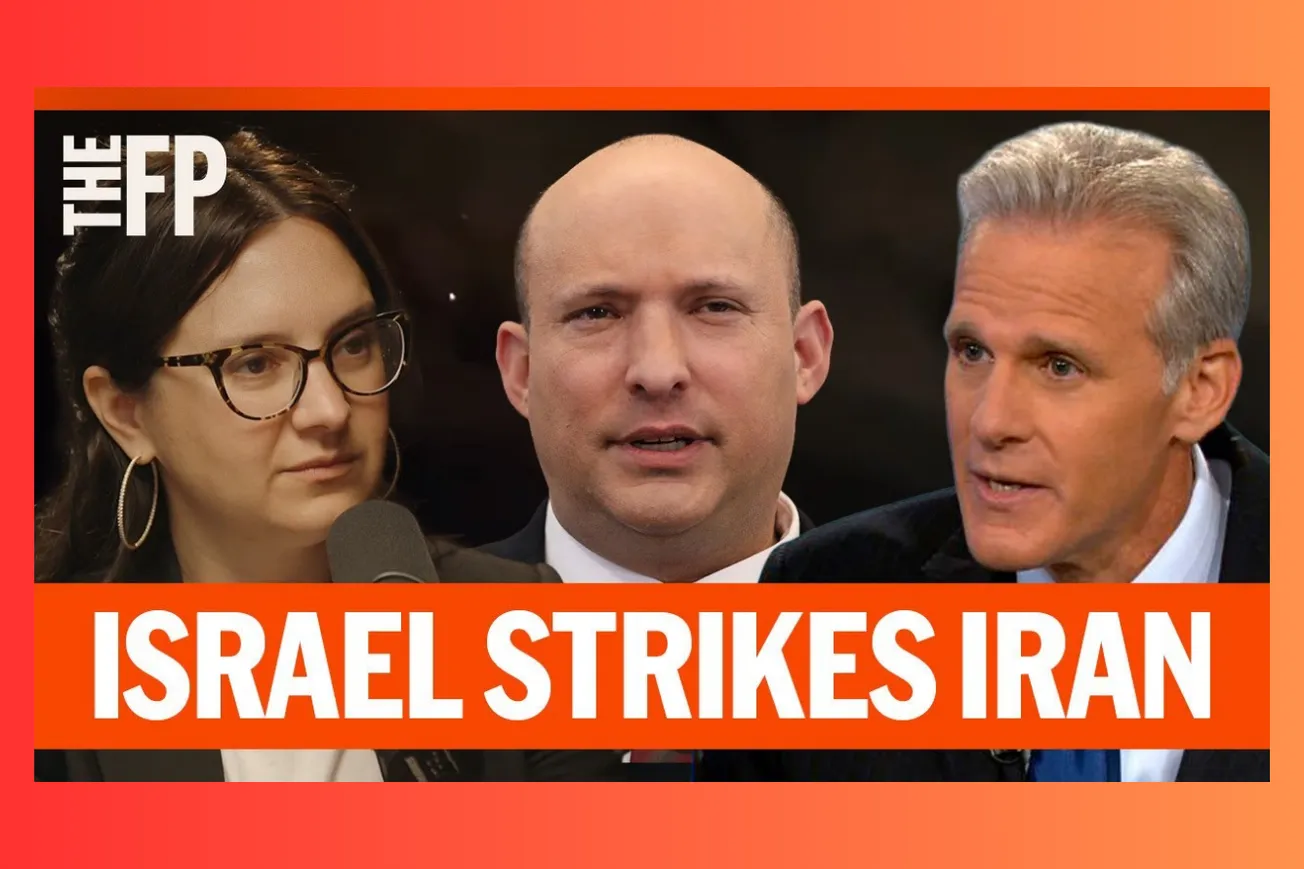Table of Contents
What unfolded Friday night represents the most significant military operation in Israeli history - a multi-faceted, unprecedented assault on Iran's nuclear program that could reshape the entire Middle East for generations.
Key Takeaways
- Israel executed an "utterly unprecedented, multi-faceted, multi-targeted" operation involving hundreds of warplanes, submarines, ballistic capabilities, and special forces on the ground
- Four top Iranian leaders were eliminated, including Hussein Salami, head of the Islamic Revolutionary Guard Corps, plus multiple nuclear scientists
- The operation targets not just leadership but the knowledge behind Iran's nuclear program, striking facilities from Shiraz to Tehran
- This represents a fundamental shift from previous operations - unlike strikes on Iraq (1981) and Syria (2007), this campaign appears ongoing rather than a single decisive blow
- Iran possesses roughly 2,000 ballistic missiles capable of devastating retaliation, each carrying 2,000 pounds of explosives
- The timing was driven by Iran's advancement to weapons-grade uranium levels and intelligence about planned multi-front attacks on Israel
- Former PM Naftali Bennett calls this "hitting the head of the octopus" after years of fighting individual tentacles
The Unprecedented Scale of the Operation
Every Israeli received the same chilling message on their phones around midnight: proceed immediately to safe rooms or shelters. For Michael Oren, a historian who has witnessed decades of Middle Eastern conflict, the message was unmistakable: "I turned to my wife Tammy and I said, 'Okay, we've just attacked Iran.' Never experienced anything like this."
The scope of what Israel launched defies easy categorization. This wasn't just an air strike - it's a comprehensive campaign involving "hundreds of Israeli warplanes, perhaps other capabilities, submarines, ballistic capabilities" and critically, "forces on the ground whether special forces and also agents of the Mossad."
The precision of the targeting reveals extraordinary intelligence penetration. "The hits on these apartments are very, very accurate. It's not the whole apartment building on fire. It's only certain apartments," Oren observes. Israeli forces knew exactly where the head of the IRGC was sleeping, where nuclear scientists had their offices in Tehran, where missile arsenals were located.
But what makes this truly unprecedented is the dual targeting strategy. Israel isn't just eliminating current leadership - they're systematically destroying the knowledge base itself. "Targeted assassinations also of scientists who are targeting not just the leadership but the knowledge behind the Iranian nuclear program."
The underground dimension remains largely invisible to public view. While images show apartment buildings with surgical strikes on specific floors, "what we're really not seeing is what's being done underground. Iran has heavily fortified, deeply embedded nuclear facilities at Fordow, at Natanz and other sites which contain thousands and thousands of centrifuges."
Why Now? The Convergence of Urgency and Opportunity
For over two decades, Israeli leaders have warned that Iran was "on the cusp" of nuclear weapons. Critics, including some on the Israeli right, dismissed Netanyahu as "chicken" - someone who would never actually pull the trigger. So why now?
Former Prime Minister Naftali Bennett, who has been advocating for this operation for years, explains the convergence of two critical factors: "urgent need and unique opportunity."
The urgent need stems from Iran's recent acceleration toward weapons capability. They've accumulated enough enriched uranium for nine to ten nuclear weapons and, crucially, have begun taking "steps to weaponize this enriched uranium." Intelligence suggests Iran was also planning "multi-front attacks against Israel, including across the Egyptian and Jordanian borders."
But the unique opportunity is equally important. Israel has systematically degraded Iran's defensive capabilities over the past year. "All but neutralized Iran because its two main arms - its two main defense arms which are Hezbollah and Hamas are dramatically diminished. So they can't really retaliate in a meaningful way and their air defenses have been neutralized."
The timing also reflects a personal dimension that's often overlooked. As Oren notes, Netanyahu's son is getting married on Monday. "If this man is doing this for political reasons only to preserve his coalition, why would he do this in the middle of the wedding of his son? The answer has to be there has to be deeper, deeper reasons."
The Intelligence Revolution: Penetrating the Islamic Republic
The operational details emerging from this strike reveal intelligence capabilities that border on the science fictional. How does Israel know where every Iranian military leader sleeps? How do they coordinate simultaneous precision strikes across a country the size of Alaska?
The answer lies in what appears to be the most comprehensive intelligence penetration of an enemy state in modern history. Israel has spent years, possibly decades, building networks inside Iran that extend from the highest levels of government to the nuclear program itself.
"Israeli intelligence has penetrated Iran at every possible level," Oren explains. "They knew where the head of the IRGC was sleeping that night. They knew where the nuclear scientists had their offices in Tehran. Apparently, we knew where the arsenals of the long-range missiles are located."
This isn't just about recruiting assets - it's about building parallel operational capabilities inside enemy territory. The precision required to hit specific apartments in Tehran while leaving neighboring units untouched suggests real-time intelligence and guidance systems that would be impossible without extensive ground support.
Bennett's description of Iran as "the head of the terror octopus" with tentacles throughout the Middle East has guided Israeli strategy for years. Instead of fighting individual proxies - Hamas, Hezbollah, Houthis - Israel has finally decided to target the central nervous system in Tehran.
Historical Precedent: When Small States Strike Nuclear Programs
Israel has done this before, but never at this scale. The 1981 strike on Iraq's Osirak reactor and the 2007 destruction of Syria's nuclear facility both effectively ended those countries' nuclear programs. In both cases, dire predictions about retaliation and accelerated nuclear development proved false.
"To this day, there's no Syrian nuclear weapon. There's no Iraqi nuclear weapons," Oren notes. "If you have to adduce exhibit A and B of history that by moving against Iran and its nuclear weapon facilities today, the chances are that Iran will not come back and further embed its nuclear program."
But Iran presents a fundamentally different challenge. Unlike Iraq or Syria, Iran has built a distributed, heavily fortified nuclear infrastructure specifically designed to survive Israeli attack. The key facilities at Fordow are buried under mountains, accessible only to the kind of massive bunker-buster bombs that only American B-2 bombers can deliver.
This raises the crucial question: can Israel actually finish the job alone? The answer appears to be that this operation is ongoing rather than a single decisive strike. "This is an ongoing attack. It's not a one-off," Bennett explains. "We're gradually taking out the air defense systems, the ballistic missile systems, the IRGC leadership, Quds leadership, everything that moves."
The American Dimension: Coordination or Defiance?
Perhaps the most intriguing aspect of this operation involves the Trump administration's role. Marco Rubio's statement was notably cold: "Tonight, Israel took unilateral action against Iran. We are not involved in strikes against Iran." Conspicuously absent was any declaration of support or promise to help defend Israel against retaliation.
This creates two possible interpretations. Either Israel acted despite American objections, risking a fundamental rupture with its most important ally. Or this represents an elaborate deception designed to provide the U.S. with plausible deniability while Iran faces the full consequences of its nuclear program.
The evidence suggests the latter. Trump's 60-day ultimatum to Iran expired exactly one day before the strikes began. As Bennett notes, "President Trump had given a 60-day ultimatum that ran out yesterday. Today's the 61st day. So we actually attribute meaning to the words of the American president."
Steve Witkoff's recent statements warning that Iranian retaliation could be "massive, prohibitive and on a scale not less threatening to Israel than Iranian nuclearization" may have been part of an effort to maintain the appearance of American restraint while providing Israel operational freedom.
The key test will come in the next few hours: will American naval forces in the region help intercept Iranian ballistic missiles fired at Israel, as they did in previous attacks? That decision will reveal the true nature of U.S.-Israeli coordination.
Iran's Retaliation Capability: 2,000 Missiles of Terror
The immediate question facing Israel is whether it can survive what's coming next. Iran possesses approximately 2,000 ballistic missiles, ranging from medium to long-range, capable of carrying warheads with 2,000 pounds of explosives each.
To put that in perspective, Oren explains, "the bus bombs on the second intifada were about 10 pounds of explosives. This is 2,000 pounds. A house was taken in the next street from me by a Qassam rocket during the war - it took down four stories of a house that had 15 pounds of explosives in it."
Israel's defense relies on the world's most advanced multi-tiered air defense system. Iron Dome handles short-range rockets with fixed trajectories. David's Sling, developed with the U.S., targets medium-range missiles. Arrow 2 and Arrow 3 systems can intercept ballistic missiles in suborbital and orbital space.
The American presence adds additional layers: THAAD, Aegis, and Patriot systems, many sea-based, that proved effective in previous Iranian attacks. In April and October 2024, Iran fired roughly 700 ballistic missiles at Israel with minimal damage - only one caused serious injury.
But this time could be different. Iran has promised "massive" retaliation, and none of these defensive systems are foolproof. Even a 95% interception rate means that 100 missiles out of 2,000 could reach their targets.
The Domestic Political Dimension: Rally Around the Flag
One of the most striking aspects of this operation is how it has unified Israeli society after 20 months of divisive war. Even Netanyahu's harshest critics are rallying behind this decision.
"My feeling having had conversations over the last several hours is that's all changed," Oren reports. "There's a tremendous rallying around Israel. There's a rallying around this decision, around the IDF. We have hundreds, perhaps thousands of fighters, pilots and others in the air right now, on the sea, in the ground who are risking their lives to defend this country."
Bennett, who has been one of Netanyahu's most vocal critics, is unequivocal: "All Israelis stand behind this strike. All Israelis left and right. Myself who I oppose the current government. I don't think it's the right government for Israel, but I stand behind this decision."
This unity reflects Israeli understanding that this operation transcends domestic politics. Whatever Netanyahu's failings on other issues, Israelis recognize that preventing Iranian nuclear weapons is existential. As one observer put it, if an Iranian nuclear weapon detonates over Tel Aviv, none of Netanyahu's other mistakes will matter.
The Regional Transformation: A New Middle East
If this operation succeeds, the implications extend far beyond the Iran-Israel conflict. Oren envisions "an utter transformation of the Middle East" comparable to the aftermath of the Six-Day War.
"Instead of a situation where there might have been a new Iranian nuclear deal similar to the JCPOA of 2015, we have a situation where Iran will be cowed, will be defanged, and Syria will be independent and Syria could possibly make peace with Israel. Join the Abraham Accords."
The cascade effects could be profound. Lebanon, free of Hezbollah dominance, could regain sovereignty and make peace with Israel. Saudi Arabia could finally join the Abraham Accords without fear of Iranian retaliation. The entire "axis of resistance" that Iran has built over decades could collapse.
But this optimistic scenario depends on the operation's success and Iran's response. If Iran's ballistic missile retaliation proves devastating, or if the nuclear program proves more resilient than expected, the Middle East could face years of escalating conflict instead.
The American Interest: Why This Matters Beyond Israel
One of the most important debates emerging from this operation involves whether American interests are served by supporting Israel or maintaining distance. Isolationist voices in the MAGA movement argue that Iran poses no threat to America and that this conflict only endangers American forces in the region.
Oren, who survived an Iranian assassination attempt in Washington, offers a different perspective: "Iran is the world's largest state sponsor of terror and that terror branches are throughout South America along America's borders. They penetrate America through the drug trade. They are in cahoots with the Mexican cartels."
More broadly, American credibility is at stake. "America's refusal to stand up to Iran, to stand by its allies in the Middle East who are threatened by Iran has reverberations throughout the entire world. Chinese are going to draw conclusions from that. The Russians perhaps have already drawn conclusions."
Bennett frames it in stark terms: "If North Korea had an Israel 20 or 30 years ago when they went nuclear and but there was a local Israel that could take out North Korea and did it, then North Korea today wouldn't have a huge arsenal of nuclear weapons. That's a fact."
The fundamental question is whether America wants to live in a world where four major adversaries - China, Russia, North Korea, and Iran - all possess nuclear weapons, or whether preventing the fourth from joining that club serves American interests.
The Historical Moment: Netanyahu's Legacy
Whatever one thinks of Netanyahu's domestic policies or handling of other aspects of the Gaza war, this operation may define his historical legacy. Like Churchill, who made numerous errors throughout his career but got the one crucial decision exactly right, Netanyahu may be remembered primarily for this moment.
The operation required extraordinary political courage. Netanyahu risked everything - his government, his legacy, Israel's relationship with America, the lives of millions of Israelis - on a strategy that could have failed catastrophically.
As Oren reflects, after 46 years of living under the shadow of Iran's declared intention to "wipe this country off the map," this represents a moment Israelis have been waiting for since 1979. "I'm quite moved tonight. I look at it as a personal milestone."
Whether this operation ultimately succeeds in preventing Iranian nuclear weapons remains to be seen. The enemy, as military strategists say, always gets a vote. Iran's retaliation could escalate this into a regional war that consumes everything in its path.
But as a demonstration that small democratic states can take decisive action against existential threats when their survival is at stake, this represents something genuinely historic. The question now is whether the Middle East that emerges from this crisis will be more stable and peaceful, or whether we're witnessing the opening act of a much larger and more devastating conflict.
The next few hours will provide the first answers. By the time Americans wake up on Saturday morning, we'll know whether Iran's promised "massive" retaliation materializes, whether American forces help defend Israel, and whether this operation represents the beginning of the end for the Islamic Republic's nuclear ambitions - or the start of something much more dangerous.





![This New Bitget Platform Changes the Game [Literally Gold]](/content/images/size/w1304/format/webp/2026/02/bitget-launches-universal-exchange-gold-usdt.jpg)